| Reviews & Columns |
|
Reviews DVD TV on DVD Blu-ray 4K UHD International DVDs In Theaters Reviews by Studio Video Games Features Collector Series DVDs Easter Egg Database Interviews DVD Talk Radio Feature Articles Columns Anime Talk DVD Savant Horror DVDs The M.O.D. Squad Art House HD Talk Silent DVD
|
DVD Talk Forum |
|
|
| Resources |
|
DVD Price Search Customer Service #'s RCE Info Links |
|
Columns
|
|
|
La Haine: Criterion Collection (2-Disc Set)
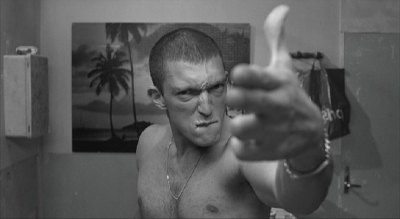
Mathieu Kassovitz's second feature film, La haine (Hate, 1995), stands tall as the French director's most critically acclaimed and passionate project to date. Often compared to Spike Lee's aggressive 1989 masterpiece, Do The Right Thing, La haine paints broad strokes with precision, focusing on racial relations and class divisions within and between urban boundaries. Our protagonists are Vinz (Vincent Cassel, Irréversible), Hubert (Hubert Koundé, The Constant Gardener) and Saïd (Saïd Taghmaoui, Three Kings), three young men from different ethnic backgrounds who have all been culturally disregarded by French society. Vinz, Hubert and Saïd each have different responses to their decaying urban surroundings, but they've clearly been left without much hope or direction.
A series of local riots immediately sets the tone for Kassovitz's slow-burning drama, reminding us that such explosive violence is a part of our protagonists' everyday lives. During the scuffle, two things of major importance have occurred: their friend Abdel lies comatose in a local hospital after a police beating, and one of the officers lost his gun in the scuffle. The former almost fuels the purpose for obtaining the latter---so when the gun is finally discovered, a new set of possibilities are included with the package. As the day and night literally tick away, the three young men find themselves buried deeper in their own environments, social stubbornness and violent instincts.
Vinz, Hubert and Saïd are obviously against authority---to varying degrees, of course---and the injury of their friend hasn't exactly brightened their outlook. Vinz (at top) is Jewish and models himself after Taxi Driver's Travis Bickle, often prone to unpredictable outbursts and focused on cold-blooded revenge. Hubert (below left) is black; he seems to be the only one with a quasi-normal family life, and is perhaps the most introspective of the three. Saïd (below right) is an Arab; like Vinz, he's more charismatic and outspoken, often serving as the mediator between his two buddies. Together, their respective roles as social outcasts are written in stone, emphasizing a clear mindset of "us" versus "them". Though it's often difficult to sympathize with the protagonists, the story is told from their perspective and is strengthened from it.
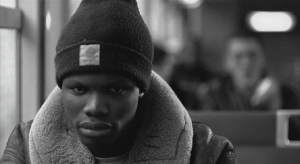
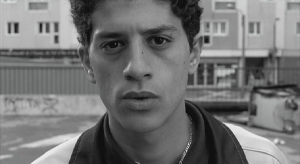
Though La haine is a character-driven film, it's the atmosphere that clearly helps to keep things grounded. The black-and-white image blends perfectly with the film's bleak mindset; crumbling buildings hint that areas have been abandoned, while vandalized walls and distant music remind us that people still live here. La haine argues that young folks are a product of their own environments, for better or worse. Police officers are often portrayed as racist and condescending---and though this isn't a reckless "anti-cop" film, it's clearly resentful of blind authority in any form.
The film's open-ended conclusion lets us draw our own conclusions, but make no mistake about it: La haine doesn't exactly wallow in optimism. Kassovitz was barely pushing 30 when the film was unleashed on international audiences, earning him the Best Director prize at Cannes and multiple César awards (among others). This is clearly a polarizing film, but one with a passionate and bold message: no matter where, when or why, violence only breeds more violence.
Criterion's 2-disc treatment of La haine marks the first Region 1 release of the film on DVD, so it's no surprise that fans have much to look forward to. The film itself has been blessed with an excellent technical presentation and a host of extras, enough to complement the narrow-focused main feature perfectly. Let's take a closer look, shall we?

Presented in its original 1.85:1 aspect ratio and enhanced for widescreen displays, La Haine looks excellent from start to finish. Originally shot on color film stock and subsequently developed in black and white, the image appears crisp, natural and vibrant in spite of its gritty atmosphere. Digital problems don't appear to be an issue here; the transfer is free from edge enhancement, digital combing and the like. As a footnote, La haine does not appear to have been substantially windowboxed, unlike several of Criterion's newer releases.
Surprisingly, the film's audio presentation is equally impressive. Available in your choice of French Dolby Digital 5.1 and 2.0 mixes, the subtle but immersive world of La haine comes through clean and clear. Dialogue is typically anchored up front, but the spacious soundstage is enhanced by terrific atmospheric touches---the kind that tricks viewers into looking out windows and over shoulders. From passing cars to music playing in the distance, the rugged landscape of La haine has never sounded better. Optional English subtitles are provided during the main feature and French-spoken supplements.
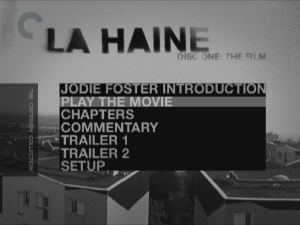
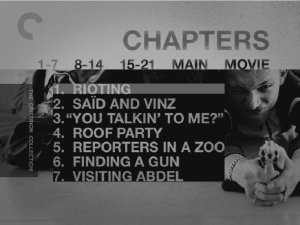
The main feature itself is paired with an Audio Commentary by director Mathieu Kassovitz, who speaks incredibly fluent and understandable English. There's a bit of overlap between this and a few supplements from Disc 2, but those who enjoyed La haine should certainly find it worth a listen. Kassovitz may sound laid-back at times, though a great deal of his comments certainly aren't; the main feature is over 10 years old, but the director draws damning comparisons to the France of today. Recorded exclusively for this release, Kassovitz also goes into modest detail about the production experience, story origins and the immediate impact La haine had on general audiences and critics alike.
Closing out this first disc is a pair of brief Theatrical Trailers (roughly 0:30 each), both of which sell the film dramatically without giving away too much. Oddly enough, these trailers have been presented in non-amamorphic widescreen, unlike virtually every other supplement on this two-disc set.
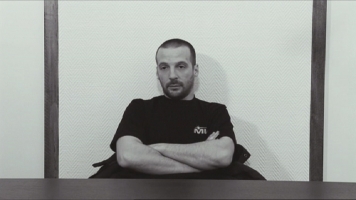
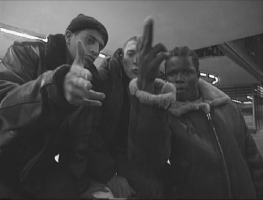
A pair of longer featurettes leads off Disc 2, beginning with Ten Years of La haine" (83:25, above left). This relatively new documentary brings together key cast and crew members a decade after the film's release, detailing the film's social impact and critical success. It's not all back-pats and high fives, though: as hinted at in the commentary, a number of roadblocks threatened the filmmakers early on. Still, Kassovitz and company recollect the overall production as extremely smooth; surprising, given the rough subject matter.
"Social Dynamite" (33:59) is a newly-recorded video featurette focusing on La haine's gritty banlieue setting. This takes a slight detour and includes interviews with sociologists Sophie Body-Gendrot, Jeffrey Fagan and William Kornblum---and though a few interesting facts and parallels are presented, this is a much drier presentation that isn't quite as effective as the audio commentary or "Ten Years" documentary.
Two shorter collections of footage are up next; the first is "Preparing for the Shoot" (5:57), recorded when the crew first arrived on location. Presented in roughly a 1:1 aspect ratio, this down-to-earth piece displays hints of the cast and crew's initial apprehension. Also here is "Making of a Scene" (6:36, above right), offering a behind-the-scenes look at Vinz's cop-killing daydream. As this was one of the film's most technically challenging sequences, this featurette presents a few glimpses of practical effects without giving away too much.
We're also treated to a brief collection of Deleted and Extended Scenes ("Rooftop Party", "Homeless Man", "OCB" and "Eiffel Tower", 5:57 total), each featuring a new video afterword by Kassovitz. The director is obviously disappointed in how the deleted footage turned out, recognizing that it didn't work in context or went against the film's overall mentality. Interestingly enough, these rough sequences (presented in non-anamorphic widescreen with timecodes) appear in full color, as only the final theatrical cut was developed in black and white.
Closing things out is a Still Gallery of behind-the-scenes photos, presented in anamorphic widescreen with captions. Only a portion are candid shots, but fans of the film should appreciate this additional look at the production. As mentioned earlier, all supplements include optional English subtitles for French-spoken dialogue. This potent mix of extras complements the film well, offering a satisfying blend of vintage and retrospective material that ties together nicely.

Raw and uncompromising, Mathieu Kassovitz's La haine offers a bitter, potent look at urban decay and the turmoil created in its wake. Cassel, Koundé and Taghmaoui anchor the film with strong performances, while the gritty atmosphere reminds us that trouble is often just around the corner. Criterion's two-disc treatment does a fantastic job of preserving the film, combining a flawless technical presentation with an assortment of appropriate bonus features. All things considered, this well-rounded package is a must-buy for fans of the film and comes Highly Recommended.
Randy Miller III is an affable office monkey based in Harrisburg, PA. He also does freelance graphic design projects and works in a local gallery. When he's not doing that, he enjoys slacking off, second-guessing himself and writing things in third person.
|
| Popular Reviews |
| Sponsored Links |
|
|
| Sponsored Links |
|
|
| Release List | Reviews | Shop | Newsletter | Forum | DVD Giveaways | Blu-Ray | Advertise |
|
Copyright 2024 DVDTalk.com All Rights Reserved. Legal Info, Privacy Policy, Terms of Use,
Manage Preferences,
Your Privacy Choices | |||||||












